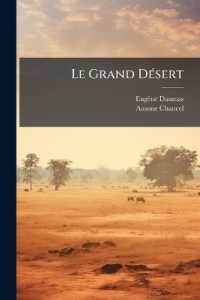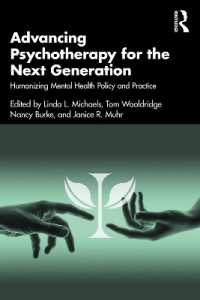- ホーム
- > 洋書
- > 英文書
- > Business / Economics
Full Description
This timely and innovative book critically explores how cultural heritage in the Global South can be used to mobilise community engagement and promote sustainable tourism at archaeological sites.
Whilst the volume covers theoretical issues, it primarily offers insight into how both small and large projects within low- and middle-income countries start, plan and develop. It describes what factors lead some projects to succeed, some to fail and most to have elements of both. Core to this investigation, each specifically commissioned chapter considers the challenges of developing collaboration and joint ownership between multiple stakeholders, ranging from local communities to national governments. In addition, the book considers how the challenges of the COVID-19 pandemic were managed, with lessons for future events of such magnitude. In summary, this significant volume recognises the value of developing collaborative partnerships between academics, NGOs and local communities, to achieve community engagement within archaeological research and support sustainable development by developing appropriate forms of tourism at archaeological sites. It provides essential reading for those interested in tourism, heritage studies, archaeology, geography, tourism studies and cultural studies.
The Open Access version of this book, available at http://www.taylorfrancis.com, has been made available under a Creative Commons [Attribution-Non Commercial-No Derivatives (CC BY-NC-ND)] 4.0 license.
Contents
1. Introduction Part 1. Asia 2. The Faynan Heritage Project: Developing a Local Museum Within a Rural Bedouin Community of Southern Jordan 3. Developing a Heritage-Themed Bedouin Handicraft Business in Faynan, Jordan: Success, Failure and Reflections 4. Community-Based Conservation and Promotion of the Neolithic Site of Beidha, Jordan 5. Sela: Community and Heritage in Jordan 6. The Land of Nineveh Archaeological Project: Cultural Heritage Protection and Enhancement, Community Engagement and Sustainable Tourism in the Kurdistan Region of Iraq 7. Building Community Archaeology Practice and Heritage Tourism for Sustainable Development in a Post-Conflict Zone: The ACT and ALIPH Projects in the Swat Valley (Pakistan) 8. Initiating the Transformation of Spanish Colonial Era Archaeology of Cagayan Province, Philippines, into Cultural Heritage Part 2. Africa 9. Community and Archaeology at Armana: Exploring Sustainable Heritage Strategies for Rural Egypt 10. Community-Engaged Archaeology at the UNESCO World Heritage Site of Jebel Barkal, Sudan 11. Co-Production Networks for Community Heritage in Tanzania (CONCH) Part 3. Latin America 12. Santa Cruz Mixtepec: Community Engagement and Religious Heritage in Mexico 13. Biocultural Heritage and Archaeology as Sources of Knowledge, Cultural Identity, Sustainable Tourism and Economic Resilience in Ligüiqui, Manabí, Ecuador 14. The PIARA Peru Project at Hualcayán: An Archaeology and Partnership of Care 15. Utilising Cultural Heritage to Improve Water Security and Agro-Pastoral Farming in the Peruvian Andes Part 4. Overview 16. Experiences, Lessons, Celebration
-

- DVD
- ようこそ映画音響の世界へ
-

- 電子書籍
- ヒナまつり【分冊版】 128 HART…






